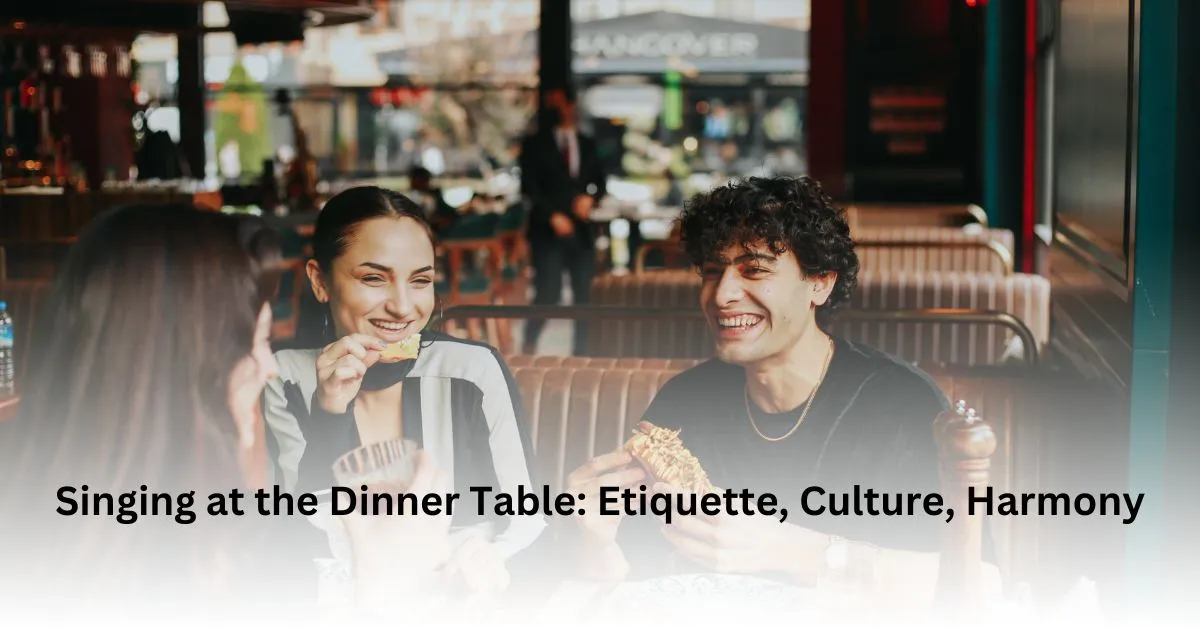Imagine the scene: you’ve meticulously prepared a sumptuous meal, the table is set with care, and you’re eagerly anticipating a delightful evening with friends or family. As you settle into your seat, ready to savor each bite and engage in lively conversation, an unexpected disruption shatters the ambiance. Someone at the table suddenly bursts into song. The initial surprise gives way to a spectrum of reactions – some chuckle with amusement, while others exchange awkward glances or shoot disapproving looks. Welcome to the contentious realm of singing at the dinner table.
Singing at the dinner table is a topic that elicits strong opinions and varied reactions. For some, it’s a spontaneous expression of joy and camaraderie, adding a touch of whimsy to the dining experience. Yet, for others, it’s perceived as a breach of etiquette, an intrusion that disrupts the rhythm of the meal and detracts from the social interaction. Indeed, the act of singing at the dinner table is a divisive issue, with perspectives ranging from embracing it as a cultural tradition to condemning it as a sign of rudeness or self-indulgence.
In this article, we delve into the multifaceted nature of singing at the dinner table, exploring its etiquette and cultural significance. We’ll navigate through the complexities of this seemingly innocuous behavior, unraveling the nuances that shape perceptions and practices. Through an exploration of etiquette guidelines, cultural norms, and personal perspectives, we aim to shed light on when singing at the dinner table might be deemed acceptable and when it’s best avoided.
At the heart of our inquiry lies the question of etiquette – the unwritten rules and social norms that govern our behavior in social settings. Etiquette guides us in navigating the intricacies of human interaction, dictating what is considered polite or impolite in different contexts. When it comes to singing at the dinner table, etiquette serves as a compass, guiding us in determining the appropriateness of this expressive act. By examining prevailing etiquette guidelines, we can gain insights into the factors that influence perceptions of singing during meals and discern the line between acceptable and inappropriate behavior.

Furthermore, we’ll embark on a journey through cultural landscapes, exploring how attitudes towards singing at the dinner table vary across different societies and traditions. In some cultures, singing during meals is an integral part of the dining experience, a cherished ritual that fosters connection and community. In others, it may be frowned upon or even taboo, seen as a breach of decorum or an unwelcome distraction. By illuminating the cultural dimensions of singing at the dinner table, we can appreciate the diversity of perspectives that shape our understanding of this phenomenon.
Through a synthesis of etiquette guidelines, cultural insights, and personal reflections, this article seeks to offer a comprehensive exploration of singing at the dinner table. Whether you’re a staunch advocate for spontaneous serenades or a staunch defender of dining decorum, join us as we navigate the nuances of this intriguing topic. Together, let’s unravel the melody of manners and explore the harmonies of cultural perspective that surround singing at the dinner table.
Historical Context
Throughout history, music and singing have played significant roles in various cultures during mealtime, reflecting the social, spiritual, and cultural dynamics of different societies. In ancient civilizations such as Greece and Rome, communal feasting was often accompanied by music and song, serving as a means of celebration and cultural expression. Musicians and performers entertained guests with melodies and lyrics, enhancing the festive atmosphere and fostering a sense of conviviality.
In medieval Europe, the tradition of courtly dining was characterized by elaborate banquets where music and entertainment were integral components. Troubadours, minstrels, and court musicians serenaded noble patrons with songs of love, chivalry, and adventure, adding an air of romance and sophistication to the dining experience. Similarly, in the courts of China and Japan, the art of dining was elevated to a form of performance, with music, poetry, and traditional rituals imbuing meals with ceremonial significance.
During the Renaissance period, dining etiquette became increasingly codified, reflecting the rise of courtly manners and aristocratic refinement. Music played a central role in formal dining ceremonies, with skilled musicians providing entertainment as guests savored elaborate multi-course meals. In the grand banquet halls of palaces and manor houses, the strains of chamber music and vocal harmonies accompanied the dining elite, enhancing the sensory experience and reinforcing social hierarchies.
Moving into the modern era, the Industrial Revolution and urbanization brought about significant changes in dining customs and cultural practices. With the rise of urban centers and the proliferation of restaurants and cafes, communal dining became more diverse and inclusive, encompassing a wide range of social classes and cultural backgrounds. While formal dining traditions persisted among the elite, informal gatherings, and neighborhood eateries emerged as vibrant hubs of social interaction, where music and song added to the conviviality of shared meals.
Cultural differences
Attitudes towards singing at the dinner table vary widely across different cultures and regions, reflecting diverse values, traditions, and social norms. In some cultures, singing during meals is embraced as a natural expression of joy and togetherness, enhancing the sense of communal bonding and shared identity. For example, in Mediterranean countries such as Italy and Greece, lively gatherings often feature spontaneous singing and musical accompaniment, creating a festive atmosphere that encourages participation and engagement.
In contrast, other cultures may view singing at the dinner table with skepticism or disapproval, considering it a distraction or breach of decorum. In Western countries with strong traditions of formal dining etiquette, such as France and England, singing during meals is generally reserved for special occasions or informal gatherings among close friends and family. In more conservative societies, such as parts of Asia and the Middle East, singing at the dinner table may be perceived as immodest or disrespectful, especially in mixed-gender settings.

Moreover, attitudes towards singing at the dinner table can also be influenced by religious beliefs and cultural values. In cultures where communal dining is imbued with religious significance, such as in Hinduism or Christianity, singing hymns or prayers may be a customary part of the mealtime ritual. Conversely, in secular societies where individual autonomy and personal space are valued, singing at the dinner table may be seen as intrusive or imposing on others’ enjoyment of the meal.
Overall, the diversity of cultural attitudes towards singing at the dinner table underscores the complex interplay of tradition, social norms, and personal preferences in shaping dining customs around the world. By appreciating the historical roots and cultural nuances of this practice, we can gain a deeper understanding of its significance and relevance in different cultural contexts.
Etiquette Guidelines- Singing at the Dinner Table
Formal dining settings:
In formal dining settings, such as fine restaurants, banquets, or official receptions, there are established etiquette guidelines that govern behavior, including expectations regarding singing at the dinner table. In these refined environments, where the emphasis is on elegance, sophistication, and decorum, singing is typically discouraged or considered inappropriate.
One reason for this is that formal dining occasions often involve multiple courses, each carefully crafted to be enjoyed with attention to flavor, texture, and presentation. Singing can disrupt the flow of the meal, detracting from the culinary experience and undermining the ambiance of refinement and sophistication that hosts strive to create. Moreover, in formal settings, there may be other forms of entertainment provided, such as live music or performances, which are curated to complement the dining experience without overshadowing it.
Furthermore, singing at the dinner table in formal settings may be perceived as attention-seeking or self-indulgent, drawing focus away from the conversation and social interaction that are central to the dining experience. Guests attending formal events are expected to adhere to the established norms of behavior, which often prioritize restraint, discretion, and respect for the surroundings. As such, spontaneous singing or loud vocalization is generally considered out of place in these contexts, and guests are encouraged to refrain from engaging in such behavior.
Informal gatherings:
In contrast to formal dining settings, informal gatherings among close friends and family often offer more relaxed norms that may allow for singing at the dinner table. In these casual settings, where the atmosphere is characterized by familiarity, warmth, and intimacy, the rules of etiquette are more flexible, and there is greater latitude for self-expression and spontaneity.
Informal meals shared with loved ones are often occasions for bonding, storytelling, and shared laughter, where the emphasis is on conviviality rather than formality. In such settings, singing can enhance the sense of camaraderie and create memorable moments of joy and connection. Whether it’s belting out a favorite tune together or serenading someone with a birthday song, singing at the dinner table among friends and family can be a cherished tradition that strengthens bonds and fosters a sense of belonging.
However, even in informal settings, it’s important to be mindful of the preferences and comfort levels of all participants. Not everyone may feel comfortable with spontaneous singing, and it’s essential to gauge the mood of the group and respect individual boundaries. Additionally, excessive or disruptive singing that overwhelms conversation or interferes with the enjoyment of the meal should be avoided, as the goal is to create an atmosphere of shared enjoyment and relaxation.

Considerations for public settings:
When dining in public settings such as restaurants or cafes, the appropriateness of singing at the dinner table depends on various factors, including the establishment’s atmosphere, the preferences of fellow diners, and cultural norms. In upscale restaurants or formal dining establishments, singing is generally discouraged, as it may disrupt the refined ambiance and detract from the dining experience for other patrons.
In more casual or laid-back eateries, such as family-style restaurants or neighborhood cafes, singing may be tolerated or even encouraged, especially if it adds to the convivial atmosphere and sense of community. Many establishments feature live music or entertainment as part of their dining experience, and spontaneous singing by patrons may be welcomed as a form of participation and engagement.
However, regardless of the setting, it’s essential to be considerate of others and mindful of the volume and appropriateness of singing at the dinner table. Loud or raucous singing that disturbs fellow diners or interferes with the enjoyment of the meal should be avoided out of respect for others’ dining experiences. Ultimately, the key is to strike a balance between self-expression and consideration for those around you, ensuring that everyone can enjoy their meal in a comfortable and enjoyable environment.
Potential Issues and Considerations
One of the primary concerns regarding singing at the dinner table is its potential to disrupt conversation and detract from the overall dining experience. While music can enhance the ambiance and create a festive atmosphere, spontaneous singing may inadvertently overshadow or interrupt meaningful dialogue among diners. In formal settings or occasions where the focus is on social interaction and engaging conversation, excessive or inappropriate singing can be perceived as intrusive or disruptive.
Moreover, if the volume or intensity of the singing exceeds reasonable limits, it may hinder communication and hinder the enjoyment of the meal for others at the table. Thus, it’s essential to strike a balance between musical expression and respectful consideration for the conversational dynamics of the dining environment.
Preferences and sensitivities:
Another important consideration when it comes to singing at the dinner table is the diverse preferences and sensitivities of individuals present. While some may enjoy spontaneous musical interludes as a source of entertainment and camaraderie, others may find it distracting or uncomfortable, especially if they prefer a quieter and more focused dining experience.
Additionally, individuals with sensory sensitivities or hearing impairments may be particularly sensitive to loud or unexpected noises, making them more susceptible to discomfort or distress caused by sudden bursts of singing. As such, it’s crucial for diners to be mindful of the preferences and sensitivities of those around them, exercising tact and consideration when deciding whether to engage in singing at the dinner table. Open communication and mutual respect are key to ensuring that everyone feels comfortable and included in the dining experience, regardless of their musical inclinations.
Cultural sensitivity:
When considering the appropriateness of singing at the dinner table, it’s essential to recognize and respect the cultural norms and customs of the individuals present, especially in multicultural or diverse dining settings. Different cultures have varying attitudes towards music and singing during meals, with some embracing it as a cherished tradition and others viewing it as a breach of etiquette or decorum.
For example, in cultures where communal singing is a customary part of social gatherings, such as certain African or Polynesian societies, spontaneous musical expression may be welcomed and encouraged as a means of fostering connection and camaraderie. Conversely, in cultures where dining is characterized by a more reserved or formal approach, such as Japan or Scandinavia, singing at the dinner table may be considered inappropriate or disrespectful. By demonstrating cultural sensitivity and awareness, diners can avoid inadvertently causing offense or discomfort to others, thereby promoting harmony and mutual understanding in shared dining experiences.

Personal Perspectives
Expert opinions:
Etiquette experts, psychologists, and cultural anthropologists offer valuable insights into the phenomenon of singing at the dinner table. Etiquette experts emphasize the importance of considering the context and preferences of those present when deciding whether to engage in singing during meals. According to them, while spontaneous musical expression can enhance the conviviality of informal gatherings among close friends and family, it’s generally advisable to exercise restraint in formal dining settings or public venues where it may be perceived as disruptive or inappropriate.
Psychologists delve into the psychological dynamics underlying individuals’ attitudes towards singing at the dinner table, highlighting the role of social norms, personal preferences, and cultural influences in shaping behavior. Cultural anthropologists provide cross-cultural perspectives on the significance of music and singing in different societies, shedding light on how cultural context shapes perceptions of dining etiquette and social interaction.
Personal anecdotes:
Personal anecdotes offer firsthand accounts of individuals’ experiences with singing at the dinner table, providing insights into the diverse range of reactions and attitudes towards this practice. Positive anecdotes may recount moments of spontaneous joy and camaraderie sparked by impromptu sing-alongs during family dinners or festive gatherings, highlighting the role of music in fostering connection and shared memories. Conversely, negative anecdotes may narrate instances where singing at the dinner table led to discomfort or discord among diners, underscoring the potential pitfalls of overlooking social cues or sensitivities. By sharing personal anecdotes, individuals can offer nuanced perspectives on the impact of singing on the dining experience and the dynamics of interpersonal relationships within social groups.
Also Read: Essential Table Manners for Kids
Conclusion
In conclusion, the appropriateness of singing at the dinner table depends on a multitude of factors, including the context of the meal, the preferences of those present, and cultural norms. In formal dining settings, where the focus is on refined etiquette and social decorum, singing is generally discouraged to avoid disrupting conversation and detracting from the dining experience. In contrast, informal gatherings among close friends and family may offer more leeway for spontaneous musical expression, provided it enhances the sense of camaraderie and is well-received by all participants. When dining in public settings, such as restaurants or cafes, it’s important to be mindful of the impact of singing on other patrons and to respect the establishment’s atmosphere and expectations.
At the heart of the debate over singing at the dinner table lies a delicate balance between self-expression and consideration for others in social settings. While music can be a powerful means of fostering connection and shared enjoyment, it’s essential to be mindful of the preferences and sensitivities of those around us. Whether we choose to sing at the dinner table or not, our actions should reflect a thoughtful awareness of the social dynamics at play and a genuine desire to enhance the dining experience for everyone involved. By striking this balance, we can create harmonious and inclusive dining environments where all individuals feel respected and valued.
